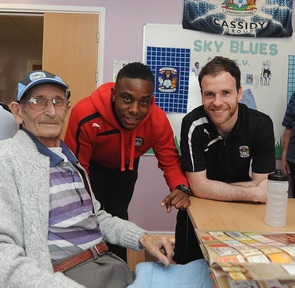Two Coventry City players show their support for dementia awareness
University Hospital (UHCW), Coventry has received a visit from two local footballing favourites in support of its Forget-Me-Not campaign launched to raise awareness of dementia.
Sky Blues goalkeeper Joe Murphy and midfielder Franck Moussa found out more on the challenges of dementia, as well as learning about the hospital’s plans to enhance care provision and even took part in some of the activities carers organise for dementia patients on a daily basis.

Clinical nurse specialist, Tracey Chapman, commented: “It was great that Joe and Franck came in to help raise awareness of this new initiative and spend time with our patients.”
A new approach introduced by the NHS Trust is to make sure each patient with dementia has a sky blue pillow case, ensuring that members of staff can feel better informed regarding that patient’s mental state.
As Ms Chapman explains: “The sky blue pillow case is a discreet way for staff to identify patients with dementia and confusion and to remind them that these patients may need more of their time and patience. UHCW has a long history of practices designed to raise standards of care for those with dementia and confusion.
“We hope to roll out the sky blue pillow case initiative to all wards in University Hospital, Coventry and the Hospital of St Cross, Rugby in the next six months and we hope this enables us to raise standards of care even more.”
Goalkeeper Joe Murphy spoke warmly of the visit, saying: “When we first received the request to come and support this initiative we were very keen to be part of it. Not only are the pillow cases aptly named but with dementia affecting so many people’s lives it is wonderful to see that loved ones can rest assured that their relatives are getting the best care possible. The nurses at UHCW who we met were so warm and committed to improving the hospital stay for patients with dementia.”
Franck Moussa, who has scored 14 goals for the club so far this season, added: “Both Joe and I didn’t know much about dementia before our visit, but we realise now that this affects many people’s lives. It was great to see how the nurses and activity co-ordinators interact with patients with dementia and treat them as individuals.”
Latest News
 29-Jul-24
Dementia Bus gives carehome.co.uk staff insight into life with dementia
29-Jul-24
Dementia Bus gives carehome.co.uk staff insight into life with dementia
 01-Mar-24
Find out the top care homes in 2024
01-Mar-24
Find out the top care homes in 2024
 21-Mar-23
UK's top care homes in 2023 revealed
21-Mar-23
UK's top care homes in 2023 revealed
 03-Jan-23
carehome.co.uk launches free care helpline
03-Jan-23
carehome.co.uk launches free care helpline
 13-Dec-22
5 mins with Emily Whitehurst, chief operating officer for Constantia Healthcare
13-Dec-22
5 mins with Emily Whitehurst, chief operating officer for Constantia Healthcare